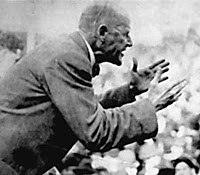Eugene Victor Debs – railroad fireman, union organizer, socialist, and presidential candidate – was born on November 5,  in 1855. Yesterday would have been his 158th birthday. He died on October 20, 1926.
in 1855. Yesterday would have been his 158th birthday. He died on October 20, 1926.
For some reason, I have always been intrigued by Debs. Perhaps it has been because he was a leader in the American Labor Movement and its development in the late 1800s. It may be because of his role in the founding of the Industrial Workers of the World union and the Socialist Party of the United States. Or, it may simply be the fact that he was a simple working man who was an advocate for the rights of other working men and women.
Whatever the reason, Eugene V. Debs, is a hero of mine.
 I read the classic biography of Eugene Debs, The Bending Cross by Ray Ginger, about ten years ago to learn more the man. It was a great book. I also read Debs’ speeches and articles that I am able to find on the web. These speeches and articles give me insight into who the man was as well as give me a great look into the history of labor in America, and I enjoy that. They are also inspiring and motivating.
I read the classic biography of Eugene Debs, The Bending Cross by Ray Ginger, about ten years ago to learn more the man. It was a great book. I also read Debs’ speeches and articles that I am able to find on the web. These speeches and articles give me insight into who the man was as well as give me a great look into the history of labor in America, and I enjoy that. They are also inspiring and motivating.
Therefore, in honor of Eugene V. Debs this evening, I would like to share a few quotes from two Deb’s articles that were published in the Locomotive Firemen’s Magazine in 1890. The magazine, which Debs edited, was the official organ of the Brotherhood of Locomotive Firemen union. Debs eventually left the Brotherhood and helped form the American Railway Union in Chicago in 1893.
The first two quotes are from an article entitled “The Common Laborer.” It was published in the Firemen’s Magazine in April 1890.
As Debs begins this article, he makes a qualifying statement. He writes that “We use the term ‘common laborer’ in no derogatory sense.” This term is innocently used to refer to working men and women and is meant to say that no worker or labor can be thought of or called “common.” All workers and labor have value.
“We make no apology for asserting that the welfare of the country centers in the one fact of doing absolute justice in all matters relating to fair wages for work, by which we mean such wages as shall make the home of the American workingman exempt from the ceaseless peril of mendicancy.”
” … when wages fall below securing such requirements the American idea is to organize for the purpose of attaining them. It is clear, therefore, that the American idea is the betterment of the American workingman regardless of trade.”
The next set of quotes are from an article that was attributed to Debs. The article is “What Can We Do for Working People?” and was published in April 1890.
Debs begins this article by saying that “In one form or another certain persons are continually asking, ‘What can we do, or What can be done for working people?'” He answers this question by sharing how different groups or classes of people might answer the question:
- Slave owners of old would have said they had a responsibility given to them by Providence to care for their “human chattel” by keeping them fed, clothed, housed, and at work.
- Philanthropists would say that their responsibility would be to provide free soup and baths to working people and enact “more stringent laws against idleness and tramping, together with more improved machinery in penitentiaries.”
- Another group of people, probably the business class, would tell working men and women that “unless they consent to abandon their labor organizations, absolve themselves from all obligations to such organizations, so far as they are concerned that shall have no work at all.”
In response, Debs says that the real question is, “What can workingmen do for themselves?”
“The answer is ready. They can do all things required, if they are independent, self-respecting, self-reliant men.”
“Workingmen can organize. Workingmen can combine, federate, unify, cooperate, harmonize, act in concert. This done, workingmen could control governmental affairs…. By acting together they could overthrow monopolies and trusts.”
“Workingmen are in the majority. They have the most votes. In this God favored land, where the ballot is all powerful, peaceful revolutions can be achieved. Wrongs can be crushed – sent to their native hell, and the right can be enthroned by workingmen acting together, pulling together.”
“What can workingmen do for themselves? They can teach capitalists that they do not want and will not accept their guardianships; that they are capable of self-management, and that they simply want fair pay for an honest day’s work, and this done, ‘honors are easy’.”
******************************
Eugene Debs lived and labored for the rights of working men and women over one hundred years ago. Time has passed and many things have changed since he was involved in the burgeoning American Labor Movement.
But one thing has not changed. We are still fighting for decent living wages for working men and women and their families, safe working conditions on the job, health and retirement benefits, and the right to form unions. And, we are still fighting against a plutocratic class that would suppress labor, and in so doing, create and maintain a part-time, low-come “labor market”; suppress the voting rights of women, minorities, and the poor; institute austerity programs that endanger children, the poor, the elderly, and the infirmed; and increase their wealth at the expense of the working and middle classes.
Eugene V. Debs was a one-of-a-kind of a man during his time. We need men and women like him today.

